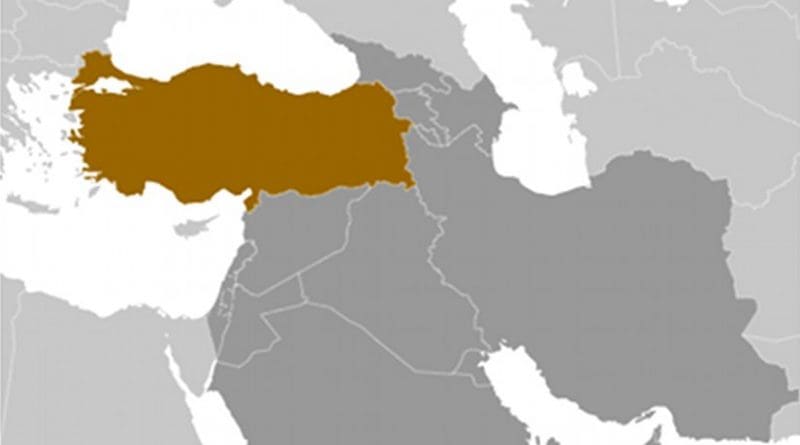Turkey: Are Profits Or Principles Guiding Ankara’s Foreign Policy?
By Eurasianet
By Yigal Schleifer
Only a few weeks ago, Turkey’s prime minister, Recep Tayyip Erdogan, was in the vanguard of those calling for political change in Egypt. These days, Erdogan’s government in Ankara is taking a very different approach toward the uprising in Libya.
Turkey is opposing the imposition of sanctions against the regime of strongman Muammar Qaddafi, as well as resisting any NATO-led military intervention in the country. Erdogan also pointedly refused suggestions that he return a “human rights” prize awarded to him in 2009 in Tripoli by a Qaddafi family foundation.
While Erdogan’s position on the Egyptian crisis helped raise Turkey’s profile in the Middle East, experts say Ankara’s stance on Libya – a large part of it dictated by concerns over the fate of large-scale Turkish investments in the North African country – could prove problematic, possibly diminishing some of the country’s newfound regional prestige.
“The ongoing Libyan crisis, with no end in sight, has created a problem for the Turkish government,” says Bulent Aliriza, head of the Turkey Project at the Center for Strategic and International Studies. “The contradiction here is that instead of being able to repeat what he said during the Egyptian crisis, Prime Minister Erdogan has clearly taken into account … commercial interests which require maintaining ties with the embattled [Libyan] regime. That undercuts the role of Turkey as a potential model for countries in the Middle East.”
Ankara’s Libya policy, particularly its opposition to any sort of NATO-led intervention there, could also undermine some of the recent gains Turkey has made in repairing its ties with the United States, says Omer Taspinar, a Turkey expert at Washington’s Brookings Institution.
“I think it’s costing in terms of [U.S. President Barack] Obama’s patience and it’s costing in terms of relations with the Pentagon, which has been a strong supporter of Turkey. It’s being seen as a serious mistake by Turkey,” he said.
Turkey’s economic interests in Libya are extensive, particularly in the construction sector, where the country has secured some $15.5 billion in tenders over the last five years, representing 15 percent of its global contracting business. Trade between the two countries has also been growing steadily, increasing by 60 percent over the last two years.
When Turkey was forced to evacuate the estimated 25,000 of its citizens working in Libya in a massive rescue operation, Foreign Trade Minister Zafer Caglayan assured journalists, as one newspaper put it, “that Turkish contractors have no intention of pulling out from Libya but have simply paused operations for security reasons.”
“We have a huge stake, a lot of interest in that country. The situation for us is different than other countries, so we have to be very careful,” Selim Yenel, a deputy undersecretary at the Turkish Ministry of Foreign Affairs, said at a recent briefing in Washington. “When Qaddafi is killing his own people, you have to be careful about your own citizens. Nobody knows what is going to happen there, so we have to be more cautious.”
While Turkish officials have said that they are approaching the changes in the Middle East on a “case by case” basis, Brookings’ Taspinar said the gap between Ankara’s position on Egypt and Libya reflects a more profound internal struggle within Turkish policymaking circles. “Turkey is torn between a kind of idealistic narrative of Turkish foreign policy and a more mercantilist realpolitik,” he said.
Underscoring this dilemma, Ankara has had very little to say about developments in Iran, where Turkish President Abdullah Gul and a delegation of 100 business executives last month went on an official visit, landing in the midst of large-scale protests that were violently put down by the authorities. Turkey has also said very little about some of the protests in other autocratic countries in the Middle East, including Yemen, where Gul and another delegation of entrepreneurs visited in January.
“Ultimately, the Turks have become a status quo power in the region and are therefore reluctant to see change,” said Henri Barkey, a visiting scholar at the Carnegie Endowment for International Peace in Washington.
“In many ways, Libya represents a test of what Erdogan said in parliament to his group,” continued Barkey. He was referring to comments made by the prime minister at a recent meeting of the parliamentary faction of his Islamic-rooted Justice and Development Party (AKP). “The AKP government is the people taking power through democratic means; it is the people shouting loud on the side of democracy; it is a stand against the status quo,” he said.
“The question is here is one of principled leadership on behalf of the Turks,” said Barkey.
Yigal Schleifer is the editor of EurasiaNet’s Turko-file blog.

